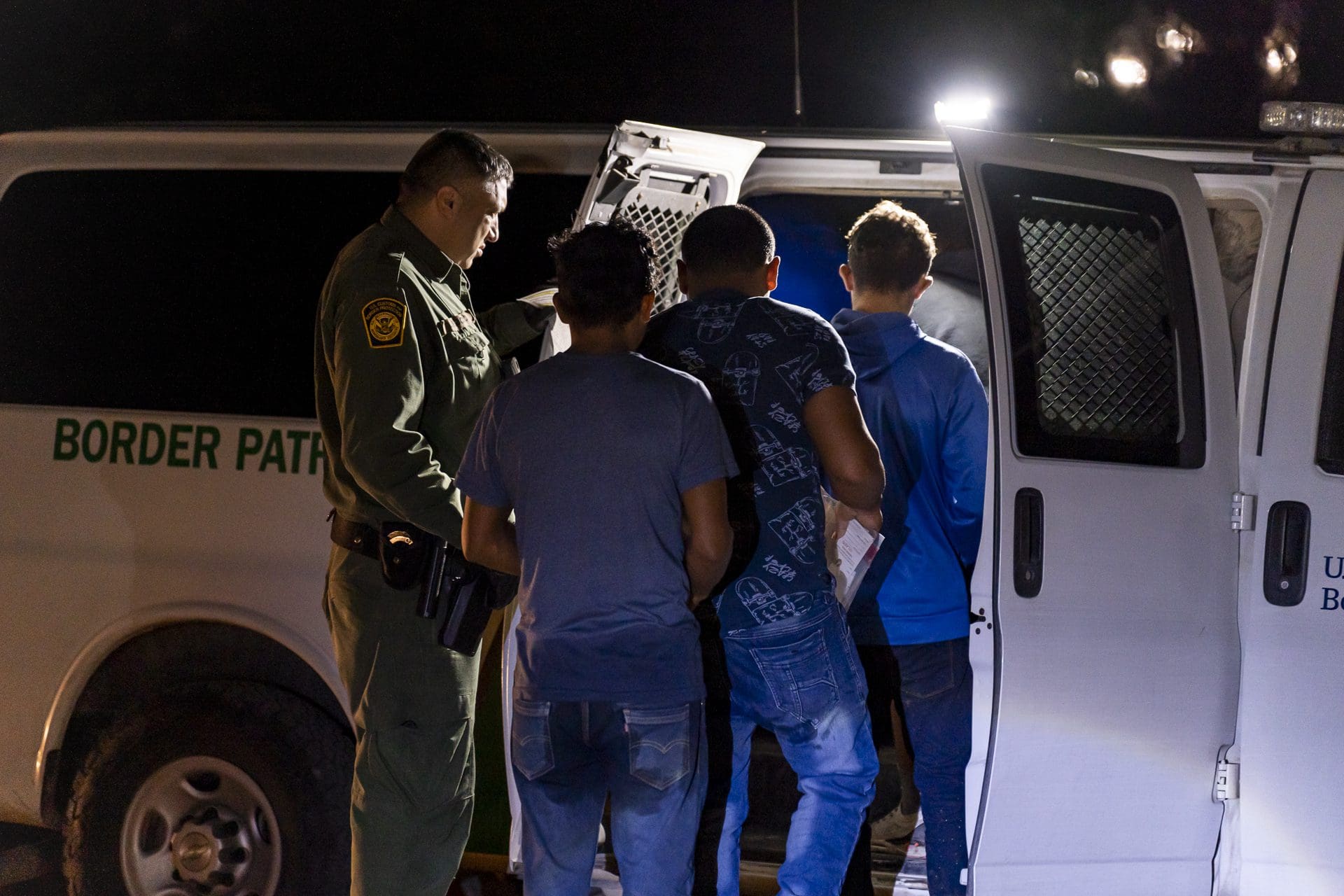An internal audit found problems at a state agency’s unit tasked with helping combat human trafficking. These findings come as Texas remains ground zero in the fight against sex trafficking, which is a component of human trafficking.
A source claims the troubled unit has since been disbanded, and its duties and members reassigned to different departments.
The Tip
In October 2023, a new and unique source advised Texas Scorecard to send an open records request to the Texas Department of Licensing and Regulation (TDLR). Specifically, the source advised us to request an internal audit of TDLR’s Anti-Trafficking Unit (ATU). The source claimed that the ATU unit “was disbanded” after the audit and “some people left the agency” or were perhaps “terminated” due to the audit.
Furthermore, the source claimed that TDLR’s Executive Director, Mike Arismendez, had suddenly resigned, and the reason was unknown. Arismendez’ resignation was widely reported on October 31, 2023. He had been with TDLR since 2000 and became executive director in 2022. A boxing journalist alleged on X at the time that the resignation was connected to a fighter failing a drug test. Combat sports is reportedly one of the areas TDLR oversees.
The source that contacted Texas Scorecard also said most of TDLR’s top level management had exited over the past year or so. The source also said that state lawmakers had given the agency a more than $1.5 million budget increase to pay for 15 new positions at ATU. “Then they disband it and use those positions by scattering them all throughout the department,” the source wrote.
Texas Scorecard sent the open records request on October 31, 2023. TDLR delivered the internal audit on November 10. The document, published on September 1, 2023, appeared to confirm that ATU had been disbanded.
Several recommendations were made to correct highlighted problems. Management is reported to have agreed with the given recommendations, with an implementation date of March 31, 2024. Regarding issues with ATU’s standard operating procedures (SOPs), included in TDLR management’s response was the following:
TDLR’s anti-trafficking work is being restructured with a new division of duties. The plan is to transfer all investigative duties to our Enforcement Division and Enforcement will communicate with law enforcement according to their standard operating procedures already in place … The anti-trafficking team personnel have been realigned within the Compliance division and there they will develop new policies and procedures, which will be reviewed by management.
In response to Texas Scorecard‘s inquiry about the audit, TDLR Communications Manager Tela Goodwin Mange wrote in a statement:
The Anti-Trafficking Unit has been functionally realigned across divisions to create a more effective anti-trafficking effort within TDLR. All investigative duties were moved to our Enforcement Division, which communicates with law enforcement as appropriate. The Enforcement Division prioritizes investigations on a risk-based scale, and they handle trafficking referrals as a high priority. Anti-trafficking team personnel were transferred to the Compliance Division, where they are conducting research and working with law enforcement agencies, non-governmental organizations and other groups on education, training, and outreach activities.
Mange’s statement is printed in full at the end of this article.
The Audit
The 15-page audit—conducted by Weaver and Tidwell, LLP—found only one of TDLR’s Anti-Trafficking Unit’s three objectives earned a “strong” rating. The other two earned an “unsatisfactory” rating. The reported flaws include a need to prioritize referrals from law enforcement, as well as improve communication with law enforcement and TDLR team members, document maintenance, and referral tracking. The audit also noted that retention of “investigative inspections documentation” was “inconsistent.”
The audit’s “report ratings” ranked areas on how their goals and objectives conformed with TDLR’s, whether agency goals and objectives were being met, and functionality. Two areas earned an unsatisfactory rating (the lowest), meaning they were found to be “weak and frequently [falling] below expected levels.”
More details were found in the second benchmark of the audit: “Risk Ratings.” There are three risk ratings: low, moderate, and high. A high-risk finding includes, but is not limited to, issues that could have repercussions outside of TDLR, a single function, or department; threats to TDLR’s ability to reach its “strategic objectives” or even its existence; a “potential material impact” to the agency’s funds or operations; or a solution needing “significant involvement” from agency management. In other words, anything that earns a high-risk rating is a serious issue.
ATU’s SOPs were found to be high-risk. First, the audit found ATU didn’t have “documented procedures” that point out how the unit is required to coordinate inspections with TDLR’s Enforcement Division and/or “external law enforcement” two weeks before the inspection. Also, “the ATU does not have policies that document the timeframe requirement for the forwarding of an administrative or prosecution referral to be sent to TDLR’s Enforcement Division or to LE [Law Enforcement] agencies when the results of an inspection indicate potential human trafficking.”
Furthermore, ATU’s SOPs have not been reviewed by TDLR management.
ATU earned another high-risk flag for “not consistently” prioritizing referrals from law enforcement, and not setting them up in a “timely” manner in their Live Assignment Tracker and their legal files.
Two areas earned “moderate” risk ratings: Maintaining Supporting Documentation and Investigative Inspections.
Regarding maintenance of supporting documentation, the audit found a “lack of compliance with policies and procedures” that resulted in “inconsistent documentation, file retention, referral prioritization and performance throughout routine procedures.” Weaver and Tidwell came to this conclusion after selecting a sample of 25 out of 388 investigative inspections referred to ATU. These references were received during the period of June 1, 2021 through December 31, 2022. In this sample size, 41 exceptions were identified. These include 20 that “did not have evidence that reports were submitted to TDLR Enforcement and OAG [Office of Attorney General] within the required 7 days.” Additionally, “12 inspection reports did not have evidence of review and approval by TDLR Management,” and eight inspections “did not have investigative reports on file.”
“The audit found room for improvement regarding establishment of and adherence to policies and procedures, and with document retention. The audit did not find that TDLR or the anti-trafficking unit failed to do their jobs identifying instances of human trafficking at TDLR-licensed establishments,” Mange wrote in TDLR’s statement to Texas Scorecard. “The audit found that the Anti-Trafficking Unit had practices in place to prioritize human trafficking referrals from law enforcement agencies, but these practices were not included in the ATU’s Standard Operating Procedures (SOPs).”
More changes have surfaced since Texas Scorecard received the audit. On January 9, the TDLR website no longer showed Kaiser as Acting Executive Director, or on the Executive Leadership Team. Instead, Brian Francis is listed as the agency’s Interim Executive Director. He was TDLR’s previous Executive Director from 2016 to early 2022. The Texas Commission of Licensing and Regulation is searching for a permanent executive director.

Left to Right: Christina Kaiser, Brian Francis
The responsible party for implementing the audit’s recommendations was TDLR’s Senior Deputy Executive Director, which was Kaiser, who the TDLR website showed on January 3, 2024 was also the acting executive director in place of Arismendez. Mange informed Texas Scorecard Kaiser retired on December 31, 2023 “after more than 30 years of public service.”
In her written statement, Mange told Texas Scorecard that TDLR completed all recommended changes early. “We agreed with each of Weaver’s findings, which you can find in the Management Responses in the audit. We had set a March 31, 2024, deadline for completing all of the actions they recommended,” Mange wrote. “Because we knew these actions were important pieces of the fight against human trafficking in our regulated industries, we completed all of the recommended actions by October 2023 – the same month the audit report was released.” Kaiser retired two months later.
This change in TDLR leadership raises more questions.
Context
The facts in this article lose meaning and importance without context.
Texas is ground zero in the war against sex trafficking. Texas Scorecard examined this issue in our May 2023 investigative series Destroying Souls (parts one, two, three, and four).
Since 2019 and 2020, Texas has been ranked as second only to California for this slave trade. In 2019, state lawmakers decided to take action against human and sex trafficking. The two are very much intertwined even though they are different, according to specialist Jaco Booyens. He leads a ministry dedicated to fighting sex slavery. “Sex trafficking seems to always be prevalent in human trafficking,” he previously told Texas Scorecard.
According to the audit, as part of lawmakers’ 2019 efforts to “effectively and efficiently” eradicate human trafficking in the state, the Texas Department of Licensing and Regulation’s Anti-Trafficking Unit (ATU) was created. Its task was “to perform inspections for potential trafficking activities at businesses where the agency has oversight responsibility.” These include identifying sex trafficking at illicit massage businesses and human labor trafficking in ”barbering and cosmetology, electrical, and air conditioning and refrigeration.”
As covered in part three of Destroying Souls, brothels disguised as massage businesses are a massive problem. These types of illegal businesses also appear to enslave those for whom English is a second language.
ATU, as the internal audit states, “is not a law-enforcement body” and coordinates with local law enforcement and other groups and organizations. “The ATU works in conjunction with TDLR Field Operations staff to identify signs of human trafficking through the onsite inspection process within the businesses that TDLR regulates.”
Jaco Booyens told Texas Scorecard in May 2023 that Texas is the “No. 1 state in the United States for children sexually exploited in trafficking.” He also identified Houston and Dallas as the state’s two major hubs.
Children are the key target in this immoral trade. Selene Rodriguez of the Texas Public Policy Foundation told Texas Scorecard in that series that the average age of sex slavery victims is 16 to 20 years old, particularly for females. “We cannot also forget that males are victims of sex trafficking as well … I’ve noticed the male victims are even younger,” she told Texas Scorecard. “Unfortunately, it happens to toddlers. We’ve seen a lot of cases where it happens to 2, 3, [and] 4-year-olds.”
Both Booyens and Rodriguez stated in the Destroying Souls series that one of the key problems in Texas is that laws against sex slavery aren’t being enforced. Failure at any level of state government in combating this harms current victims and increases the risk for potential victims.

Left to Right: Jaco Booyens, Selene Rodriguez
In her written statement, Mange insisted TDLR is fighting the good fight. “TDLR employees take seriously their responsibility to potential human trafficking victims,” she wrote. “TDLR conducts periodic, unannounced inspections of massage establishments and cosmetology salons and aggressively pursues administrative penalties for both licensed and unlicensed service providers found to allow sexual activity on business premises. Since 2021, TDLR has revoked 106 massage therapy licenses due to prostitution or sexual activity occurring at massage establishments. We look forward to accomplishing even more in the fight against human trafficking in the future.”
Texas Scorecard sent inquiries about the TDLR audit to the chairs of the Texas House State Affairs Committee, State Rep. Todd Hunter (R–Corpus Christi), and Licensing and Regulation Committee, State Rep. Ken King (R–Canadian). State Sen. Bryan Hughes (R–Mineola), who chairs the Senate State Affairs Committee, was also asked about the audit’s findings.
No responses were received before publication.
On January 3, 2024, Gov. Greg Abbott announced he recognized January as “Human Trafficking Prevention Month.” Texas Scorecard subsequently sought comment from Abbott Chief of Staff Gardner Pate regarding the ATU audit. No response was received before publication.
This article is not the first red flag published regarding TDLR’s efforts against human trafficking. In July 2023, Texas Scorecard reported their resistance at the time against our request for records from their anti-human trafficking team.
According to the internal audit, a follow-up will be done in Fiscal Year 2024 to check on TDLR’s progress. “We welcome the follow-up, which will demonstrate the effectiveness of the changes we have already made and will continue to make,” Mange wrote.
Statement from Texas Department of Licensing & Regulation
The Texas Department of Licensing and Regulation (TDLR), like all larger state agencies, is required by Chapter 2102 of the Government Code to conduct an annual internal audit. For its Fiscal Year 2023 internal audit, TDLR specifically asked its Commission-appointed auditor, Weaver, to examine the agency’s anti-trafficking program to ensure that our activities are being performed at the level that TDLR and the public expect.
The audit found room for improvement regarding establishment of and adherence to policies and procedures, and with document retention. The audit did not find that TDLR or the anti-trafficking unit failed to do their jobs identifying instances of human trafficking at TDLR-licensed establishments. The audit found that the Anti-Trafficking Unit had practices in place to prioritize human trafficking referrals from law enforcement agencies, but these practices were not included in the ATU’s Standard Operating Procedures (SOPs).
The Weaver report found additional areas where we could improve. We agreed with each of Weaver’s findings,, which you can find in the Management Responses in the audit. We had set a March 31, 2024, deadline for completing all of the actions they recommended. Because we knew these actions were important pieces of the fight against human trafficking in our regulated industries, we completed all of the recommended actions by October 2023 – the same month the audit report was released.
The Anti-Trafficking Unit has been functionally realigned across divisions to create a more effective anti-trafficking effort within TDLR. All investigative duties were moved to our Enforcement Division, which communicates with law enforcement as appropriate. The Enforcement Division prioritizes investigations on a risk-based scale, and they handle trafficking referrals as a high priority. Anti-trafficking team personnel were transferred to the Compliance Division, where they are conducting research and working with law enforcement agencies, non-governmental organizations and other groups on education, training, and outreach activities.
In response to the Internal Audit, we developed standardized operating procedures and implemented controls that will allow active monitoring to ensure that our anti-trafficking efforts are operating efficiently and effectively and are documented consistently.
From the audit Conclusion:
“Based on our evaluation, ATU activities have procedures, practices, and controls in place designed to mitigate risks within significant processes at the Texas Department of Licensing and Regulation (TDLR). However, we identified opportunities to strengthen processes, formalize procedures performed, and improve effectiveness of controls within ATU processes at the TDLR. The TDLR ATU should formalize procedures for reviews, approvals, and implementation of changes made to the standard operating procedures (SOP) and reporting administrative and prosecution referrals within the expected time frame.” We agreed, and this has been done.
“The TDLR ATU should formalize procedures for prioritizing referrals from law enforcement in policy.” We agreed, and this has been done.
“Further, the TDLR ATU should develop and formalize expectations around external coordination including communication, roles, referral handoffs, and data entry.” We agreed, and this has been done.
“Additionally, the ATU should ensure that all referrals received are added to Legal Files within three business days of receiving the referral and to the Live Assignment Tracker within 90 business days of receiving the referral.” This work is now being done by Enforcement and these referrals receive the highest priority.
“The ATU should ensure that the Notification of Investigative Inspections and Request for Assistance Form is consistently used and sent to TDLR’s Field Managers and Enforcement Investigations Manager, as well as law enforcement agencies in the area, at least two weeks prior to the upcoming investigative inspection.” All investigations are now being done by Enforcement and this process is no longer required.
“The ATU should ensure that consistent documentation is retained for all investigative inspections performed including a finalized report that has been reviewed and approved.” All investigations are now being done by Enforcement, who have well-established and audited reporting requirements.
“Follow-up procedures will be performed in Fiscal Year 2024 to evaluate the effectiveness of remediation efforts to address the findings identified.” We welcome the follow-up, which will demonstrate the effectiveness of the changes we have already made and will continue to make.
TDLR employees take seriously their responsibility to potential human trafficking victims. Because TDLR regulates massage therapists, massage establishments, cosmetologists and nail salons, and many professions where labor trafficking may be present, TDLR employees and licensees can be the first ally in contact with potential human trafficking victims. TDLR conducts periodic, unannounced inspections of massage establishments and cosmetology salons and aggressively pursues administrative penalties for both licensed and unlicensed service providers found to allow sexual activity on business premises.Since 2021, TDLR has revoked 106 massage therapy licenses due to prostitution or sexual activity occurring at massage establishments. We look forward to accomplishing even more in the fight against human trafficking in the future.
Source Document
Texas Scorecard reviewed the following document for this article.
Internal Audit Report over Anti-Trafficking Unit Activities (September 2023)
This article contains highlights from this document. Citizens wishing to conduct a deep dive should click the link above.





